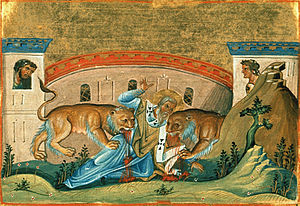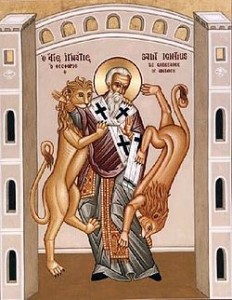For many live as enemies of the cross of Christ; I have often told you of them, and now I tell you even with tears. Their end is destruction; their god is the belly; and their glory is in their shame; their minds are set on earthly things. But our citizenship is in heaven, and it is from there that we are expecting a Savior, the Lord Jesus Christ. [Philippians 3:18-20, NRSV]
[L] St Ignatius of Antioch. [M] Painting of Ignatius of Antioch from the Menologion of Basil II (c. 1000 AD). [R] Icon of the martyrdom of Saint Ignatius.
The feast day of Saint Ignatius of Antioch is October 17.
Martyr and Church Father, St Ignatius was Bishop of Antioch in late first century. It is believed that he, along with his friend Polycarp, were very probably disciples of the Apostle Saint John.
Around 107 AD, during the reign of the Emperor Trajan, St Ignatius was arrested by the imperial authorities, condemned to death, and transported to Rome to die in the arena. It was a political decision aimed at terrorising and demoralising all Christians. Undeterred, however, Ignatius took to encouraging them, speaking to groups of Christians at every town along the way. When the prison escort team halted at the west coast of Asia Minor to await a ship for Rome, delegations from several Asian churches came to visit Ignatius, to converse with him at length as well as to render him assistance in whatever ways they could. In turn, he managed to write seven letters that have been preserved: five to congregations that had greeted him (Ephesians, Magnesians, Trallians, Philadelphians, and Smyrnaeans), one to the congregation that would greet him at his destination (Romans), and one to his friend Polycarp, Bishop of Smyrna.
On the essential subjects of faith and love, St Ignatius’ writing remains very profitable for our instruction:
- Given a thorough-going faith and love for Jesus Christ, there is nothing in all this that will not be obvious to you; for life begins and ends with these two qualities. Faith is the beginning, and love is the end; and the union of the two together is God. All that makes for a soul’s perfection follows in their train, for nobody who professes faith will commit sin, and nobody who possesses love can feel hatred. As the tree is known by its fruits, so they who claim to belong to Christ are known by their actions; for this work of ours does not consist in just making professions, but in a faith that is both practical and lasting. Indeed, it is better to keep quiet and be, than to make fluent professions and not be. No doubt it is a fine thing to instruct others, but only if the speaker practices what he preaches. One such Teacher there is: He who spake the word, and it was done; [Ps 33,9] and what He achieved even by his silences was well worthy of the Father. A man who has truly mastered the utterances of Jesus will also be able to apprehend His silence, and thus reach full spiritual maturity, so that his own words have the force of actions and his silences the significance of speech. Nothing is hidden from the Lord; even our most secret thoughts are ever present to Him. Whatever we do, then, let it be done as though He Himself were dwelling within us, we being as it were His temples and He within us as their God. For in fact, that is literally the case; and in proportion as we rightly love Him, so it will become clear to our eyes. [The Epistle to the Ephesians, 14-15]
As one of the five Apostolic Fathers (the earliest authoritative group of the Church Fathers), St Ignatius lived a life in the imitation of Christ. In contrast to the contemporary materialist culture which, according to Pope Francis, has seriously invaded the inner life of the Church, what St Ignatius wrote on earthly pleasures brings to mind the ascetic life of St Paul:
- I am God’s wheat, ground fine by the lion’s teeth to be made purest bread for Christ. No earthly pleasures, no kingdoms of this world can benefit me in any way. I prefer death in Christ Jesus to power over the farthest limits of the earth. He who died in place of us is the one object of my quest. He who rose for our sakes is my one desire. The time for my birth is close at hand. Forgive me, my brothers. Do not stand in the way of my birth to real life; do not wish me stillborn. My desire is to belong to God. Do not, then, hand me back to the world. Do not try to tempt me with material things. Let me attain pure light. Only on my arrival there can I be fully a human being. Give me the privilege of imitating the passion of my God.
An old prayer translated into contemporary English reads:
- “Almighty God, we praise you for your bishop and martyr Ignatius of Antioch, who offered himself as grain to be ground by the teeth of wild beasts that he might present to you the pure bread of sacrifice. Accept the willing tribute of our lives, and give us a share in the pure and spotless offering of your Son Jesus Christ; who lives and reigns with you and the Holy Spirit, one God, for ever and ever.”
Amen.
Copyright © Dr. Jeffrey & Angie Goh, June 2015. All rights reserved.
You are most welcome to respond to this post. Email your comments to us at jeffangiegoh@gmail.com. You can also be dialogue partners in this Ephphatha Coffee-Corner Ministry by sending us questions for discussion.



